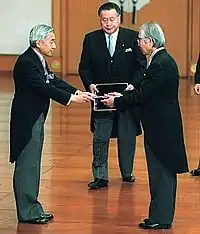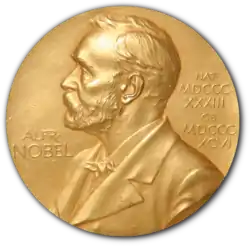Hideki Shirakawa
Hideki Shirakawa (白川 英樹, Shirakawa Hideki, born August 20, 1936) is a Japanese chemist, engineer, and Professor Emeritus at the University of Tsukuba and Zhejiang University. He is best known for his discovery of conductive polymers. He was co-recipient of the 2000 Nobel Prize in Chemistry jointly with Alan MacDiarmid and Alan Heeger.
Hideki Shirakawa | |
|---|---|
 Hideki Shirakawa | |
| Born | August 20, 1936 Tokyo, Japan |
| Nationality | Japanese |
| Alma mater | Tokyo Institute of Technology |
| Known for | Conductive polymers |
| Awards | Nobel Prize in Chemistry (2000) Person of Cultural Merit (2000) Order of Culture (2000) |
| Scientific career | |
| Fields | Chemistry |
| Institutions | University of Pennsylvania University of Tsukuba |
| Influences | Alan G. MacDiarmid |
Early life and education

Hideki Shirakawa was born in Tokyo, Japan, in the family of a military doctor. He lived in Manchukuo and Taiwan during childhood. Around third grade, he moved to Takayama, Gifu, which is the hometown of his mother.
Shirakawa graduated from Tokyo Institute of Technology (Tokyo Tech) with a bachelor's degree in chemical engineering in 1961, and his doctorate in 1966. Afterward, he obtained the post of assistant in Chemical Resources Laboratory at Tokyo Tech.
Career

While employed as an assistant at Tokyo Institute of Technology (Tokyo Tech) in Japan, Shirakawa developed polyacetylene, which has a metallic appearance. This result interested Alan MacDiarmid when MacDiarmid visited Tokyo Tech in 1975.
In 1976, he was invited to work in the laboratory of Alan MacDiarmid as a post-doctoral fellow at the University of Pennsylvania. The two developed the electrical conductivity of polyacetylene along with American physicist Alan Heeger.[1][2]
In 1977 they discovered that doping with iodine vapor could enhance the conductivity of polyacetylene. The three scientists were awarded the Nobel Prize in Chemistry in 2000 in recognition of the discovery. With regard to the mechanism of electric conduction, it is strongly believed that nonlinear excitations in the form of solitons play a role.
In 1979, Shirakawa became an assistant professor in the University of Tsukuba; three years later, he advanced to a full professor. In 1991 he was appointed as Tsukuba's Chief of Science and Engineering Department of Graduate School (until March, 1993), and as Tsukuba's Chief of Category #3 group (until March, 1997).
The Nobel Prize
Shirakawa awarded the 2000 Nobel Prize in Chemistry together with UPenn's physics professor Alan J. Heeger and chemistry professor Alan G. MacDiarmid, "for the discovery and development of conductive polymers".[3] He also became the first non-National Seven Universities graduate of Japanese Nobel laureates, and second Japanese chemistry Nobel laureates.
Over the years, Shirakawa has been expressed that he doesn't want the Nobel Prizes to receive too much special treatment from mass media (especially the Japanese media). He hopes that many vital areas in fields outside the Nobel Prize categories will also become more widely known.[4]
Recognition
- 1983 – The Award of the Society of Polymer Science, Japan
- 2000 – SPSJ Award for Outstanding Achievement in Polymer Science and Technology
- 2000 – Nobel Prize in Chemistry
- 2000 – Order of Culture and selected as Person of Cultural Merit
- 2000 – Professor Emeritus of the University of Tsukuba
- 2001 – Special Award of the Chemical Society of Japan
- 2001 – Member of the Japan Academy[5]
- 2006 – Professor Emeritus of the Zhejiang University[6]
Relatives
One of his relatives, Hitomi Yoshizawa, is a member of the singing group Morning Musume Morning Girls. He is also related to Naoko Takahashi, the women's marathon gold medalist of the 2000 Summer Olympics.
Public issues
On 6 December 2013, the House of Councillors (Japan) approved the bill of the State Secrecy Law. Shirakawa and physics Nobel laureate Toshihide Maskawa issued a statement saying that the law:
"threatens the pacifist principles and fundamental human rights established by the constitution and should be rejected immediately...(omitted)...Even in difficult times, protecting the freedom of the press, of thought and expression and of academic research is indispensable.[7]"
See also
Notes
- Shirakawa, Hideki; Louis, Edwin J.; MacDiarmid, Alan G.; Chiang, Chwan K.; Heeger, Alan J. (1977). "Synthesis of electrically conducting organic polymers: Halogen derivatives of polyacetylene, (CH) x". Journal of the Chemical Society, Chemical Communications (16): 578. doi:10.1039/C39770000578.
- "The Nobel Prize in Chemistry 2000: Alan Heeger, Alan G. MacDiarmid, Hideki Shirakawa".
- The Nobel Prize in Chemistry 2000
- Shirakawa unhappy with way Japanese media reports Nobel issues | The Japan Times
- 会員個人情報 | 日本学士院
- http://www.zju.edu.cn/englishold/2006/1020/c11993a531485/pagem.psp
- Updated: Over Scientists' Objections, Japan Adopts State Secrets Law | Science | AAAS
References
- Biographical snapshots: Hideki Shirakawa, Journal of Chemical Education web site.
- Shirakawa, Hideki (2001). "The discovery of polyacetylene film". Synthetic Metals. 125: 3–10. doi:10.1016/S0379-6779(01)00507-0.
- Shirakawa, H. (2001). "Nobel Lecture: The discovery of polyacetylene film-the dawning of an era of conducting polymers" (PDF). Reviews of Modern Physics. 73 (3): 713–718. Bibcode:2001RvMP...73..713S. doi:10.1103/RevModPhys.73.713.
External links
- Hideki Shirakawa on Nobelprize.org
 Nobel Lecture on 8 December 2000 The Discovery of Polyacetylene Film: The Dawning of an Era of Conducting Polymers
Nobel Lecture on 8 December 2000 The Discovery of Polyacetylene Film: The Dawning of an Era of Conducting Polymers - Official Homepage in Japanese
